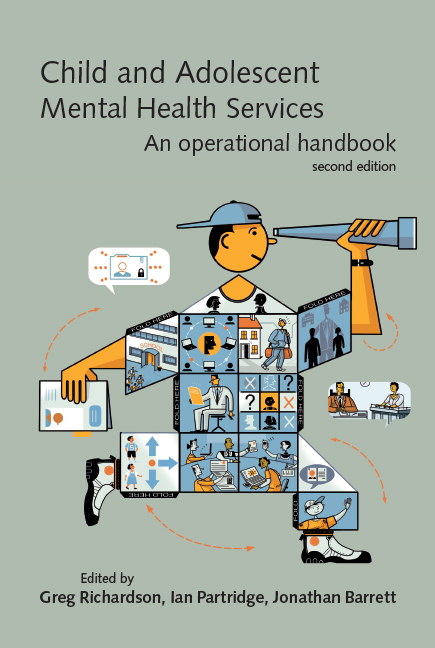Book contents
- Frontmatter
- Contents
- Tables, boxes and figures
- Contributors
- Abbreviations
- Preface
- 1 Introduction
- 2 CAMHS in context
- 3 CAMHS and the law
- 4 Structure, organisation and management of CAMHS
- 5 Evidence-based practice
- 6 Clinical governance
- 7 Education, supervision and workforce development
- 8 Multidisciplinary working
- 9 User and carer participation and advocacy
- 10 A comprehensive CAMHS
- 11 Referral management
- 12 Demand and capacity management
- 13 Strategies for working with Tier 1
- 14 Structuring and managing treatment options
- 15 CAMHS in the emergency department
- 16 Paediatric liaison
- 17 Self-harm
- 18 Learning disability services
- 19 Services for autism-spectrum disorders
- 20 Attentional problems services
- 21 Eating disorder teams
- 22 Bereavement services
- 23 CAMHS for refugees and recent immigrants
- 24 CAMHS and looked-after children
- 25 Drug and alcohol teams
- 26 Parenting risk assessment service
- 27 Court work
- 28 Tier 4 options
- 29 In-patient psychiatric care
- 30 Forensic services
- 31 Neuropsychiatry and neuropsychology services
- 32 Mental health provision for deaf children: study of a low-incidence service provision
- 33 Chief Executives – what do they want and how do they get it?
- Index
11 - Referral management
- Frontmatter
- Contents
- Tables, boxes and figures
- Contributors
- Abbreviations
- Preface
- 1 Introduction
- 2 CAMHS in context
- 3 CAMHS and the law
- 4 Structure, organisation and management of CAMHS
- 5 Evidence-based practice
- 6 Clinical governance
- 7 Education, supervision and workforce development
- 8 Multidisciplinary working
- 9 User and carer participation and advocacy
- 10 A comprehensive CAMHS
- 11 Referral management
- 12 Demand and capacity management
- 13 Strategies for working with Tier 1
- 14 Structuring and managing treatment options
- 15 CAMHS in the emergency department
- 16 Paediatric liaison
- 17 Self-harm
- 18 Learning disability services
- 19 Services for autism-spectrum disorders
- 20 Attentional problems services
- 21 Eating disorder teams
- 22 Bereavement services
- 23 CAMHS for refugees and recent immigrants
- 24 CAMHS and looked-after children
- 25 Drug and alcohol teams
- 26 Parenting risk assessment service
- 27 Court work
- 28 Tier 4 options
- 29 In-patient psychiatric care
- 30 Forensic services
- 31 Neuropsychiatry and neuropsychology services
- 32 Mental health provision for deaf children: study of a low-incidence service provision
- 33 Chief Executives – what do they want and how do they get it?
- Index
Summary
‘I'm playing all the right notes, but not necessarily in the right order.’
Eric MorecambeIntroduction
In CAMHS provision, managing referrals is perhaps the one area that illustrates most clearly the failure to understand and implement the principles of the tiered model of working. If there is one type of problem that generates concern and anxiety in families, commissioners and service providers, it is the management of the demand placed upon the service and how this demand is met.
Waiting lists in CAMHS are a common cause of distress to children's families, referrers and professionals within the service, and have been shown to increase rates of non-attendance (Subotski & Berelowitz, 1990). To avoid waiting lists and to provide an efficient service, a CAMHS must have an overt prioritisation and allocation process for its referrals. The process of allocation must be based upon managerially realistic and clinically relevant principles. As discussed previously, in the future, CAMHS should move away from a system based upon referrals, to one in which tiers are interacting and mutually supporting each other in such a fashion that the notion of referral becomes redundant and working together is integral. The effective functioning of the primary mental health worker will greatly facilitate this process. In the interim, the process of referral and allocation will be the first test of the efficiency of a CAMHS.
Where GPs have access to mental health professionals of different disciplines in adult psychiatric services, they tend to refer different patient groups to each professional (O'Neill-Byrne & Browning, 1996). It is uncertain whether these specific referrals are always geared to meeting the patients’ needs. Studies have shown that there is a poor level of understanding among GPs (Markantonakis & Mathai, 1990; Thompson & Place, 1995; Jones et al, 2000; Foreman, 2001) and paediatricians (Oke & Mayer, 1991) of the different roles of disciplines within a CAMHS. General practitioners identify quick access to services as a top priority for them when they refer children and families with mental health issues (Weeramanthri & Keaney, 2000).
All systems of referral management, however labelled, should be based upon the principles of working together, working efficiently and working in a fashion that is informed by the best evidentially substantiated clinical practice.
- Type
- Chapter
- Information
- Child and Adolescent Mental Health ServicesAn Operational Handbook, pp. 96 - 103Publisher: Royal College of PsychiatristsFirst published in: 2017

